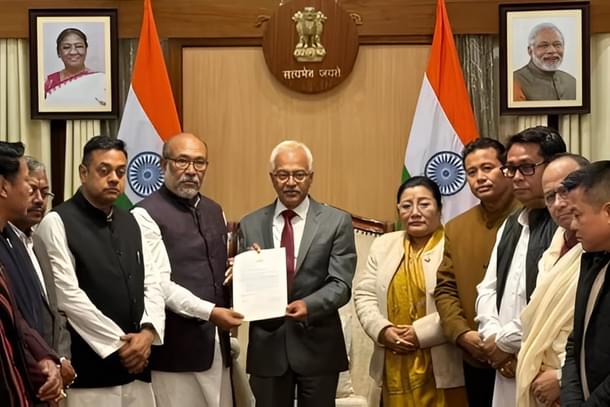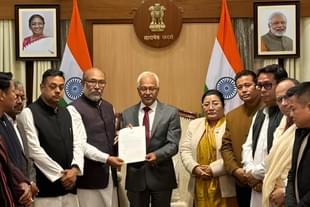North East
Why Biren Singh's Resignation Might Do Precious Little To Restore Peace In Manipur
Jaideep Mazumdar
Feb 10, 2025, 05:38 PM | Updated Feb 11, 2025, 01:10 PM IST
Save & read from anywhere!
Bookmark stories for easy access on any device or the Swarajya app.


After 22 months of violence and turmoil that has kept his state on the boil, Manipur chief minister Nongthombam Biren Singh was forced to step down from the hot seat Sunday (February 9).
The chief minister, who was summoned to New Delhi by the BJP central leadership, had a two-hour-long meeting with Union Home Minister Amit Shah Sunday morning.
He flew back to state capital Imphal the same afternoon and handed over his resignation to newly-appointed Governor, Ajay Kumar Bhalla, at the Raj Bhavan. Biren Singh was accompanied by a few of his Ministers and legislators, and also BJP central leader and Lok Sabha MP Sambit Patra.
'Forcing' him to put in his papers is being seen by many in Manipur as an unfair act on the part of the party’s central leadership. His resignation therefore is unlikely to pave the way for an immediate end to the ongoing ethnic strife.
If anything, the strife may only intensify, with Biren Singh's resignation showing the BJP central leadership in poor light.
Why forcing Biren Singh to resign was unfair
The ongoing ethnic strife in Manipur was triggered by unprovoked and well-planned attacks on Meiteis in Churachandpur by Kuki mobs on May 3, 2023.
The counter-attacks on Kukis by Meiteis in Imphal Valley set off the spiral of violence that has claimed hundreds of lives and displaced tens of thousands of people.
Soon after violence broke out in the state, the Union Government appointed Kuldeip Singh, a former Director General of the CRPF, as the security advisor. Kuldeip Singh handpicked a senior IPS officer Rajiv Singh (of the Tripura cadre) who had never served in Manipur and had no idea of the complexities of the state, as the Manipur DGP.
Kuldeip Singh became the de facto home minister of the state and had the entire law and order machinery of the state under his command. Apart from the state police, the Army, Assam Rifles, CRPF and BSF units in Manipur took instructions from him.
Chief Minister Biren Singh, thus, had no control over the state law and order machinery.
Kuldeip Singh acted in close consultation with the Union Home Ministry, including Ajay Bhalla who was the home secretary.
Since Biren Singh had little control over the state law and order machinery, it is unfair to blame him now for the violence that has rocked the state for the last 22 months.
Biren Singh’s attempts to enforce the rule of the law by curbing the activities of the Kuki militants appeared to have been rebuffed.
Central forces, especially the Assam Rifles, also faced allegations of 'giving a free hand' to Kuki-Chin militants who infiltrated into Manipur from Myanmar. The Kuki militant groups were allowed to establish their writ over Kuki-dominated areas of the hills of Manipur.
This caused acute resentment among the Meiteis, especially since the Kukis started demanding a separate state after declaring that they would not co-exist with the Meiteis under a common administrative setup.
The benign attitude of the central security forces towards the Kuki militant groups and their open acts of defiance were perceived by the Meiteis as an encouragement to the Kukis.
This resentment amongst Meities, and their perception that central forces were favouring the Kukis, fuelled more violence and led to intensification of support by Meiteis for Meitei radical groups like the Arambai Tenggol which is accused of carrying out attacks on Kukis.
Through this time, Biren Singh was virtually powerless to do anything and despite his advice, nothing was done to crack down on Kuki militants and disarm them.
Why Biren Singh’s resignation may not end the ethnic strife
One rationale for forcing Singh to step down from the Chief Minister’s post is that he had lost the confidence of the Kukis.
Replacing him with a BJP politician who is acceptable to the Kukis is being touted as a strong reason for forcing Singh to resign. The rationale is that a Meitei politician acceptable to the Kukis will be much better placed to bring the Kukis to the negotiating table, thus paving the way for ending the ethnic strife in the state.
But this logic is flawed. Yes, Biren Singh earned the ire of the Kukis. But so will any Meitei politician in the CM’s post who is committed to defending the territorial integrity of Manipur.
Defending Manipur’s territorial integrity means opposing the demand of the Kukis for a separate state or an independent administrative setup.
Preserving Manipur’s territorial integrity is a deeply emotive issue for all Meiteis and no Meitei politician will, or can, compromise on this. Thus, no replacement of Biren Singh will even be willing to discuss the Kukis’ demand for a separate state.
Any move towards negotiating the territorial integrity of Manipur runs the risk of igniting fierce unrest.
Not only is Biren Singh’s removal unlikely to pave the way for peace between Kukis and Meiteis, it may exacerbate the crisis.
That’s because the Kukis, who had been demanding Biren Singh’s resignation ever since May 2023, may well feel emboldened to assert themselves.
That means they will harden their stance on a separate state. This will only trigger angry responses from the Meiteis and deepen the gulf between the two communities.
Biren Singh’s replacement will find it impossible to bring the Kukis to the negotiating table without giving them some tangible concessions. Meiteis will never take that lying down and may rise in revolt (like they did in 1991).
Imposing President’s Rule in the state would also be inadvisable as that will place the entire state administration in the hands of bureaucrats, especially those of the MHA, who are largely seen as responsible for the mess that the state is in.
Ajay Bhalla as the home secretary has little to show for enforcing the rule of the law in the state and bringing about peace. In fact, as the Union Home Secretary, he was primarily responsible for failing to end the continuing cycle of violence.
It is feared that since Bhalla has now become the Governor of the state, possible misadventures and false moves from the Raj Bhavan in Imphal will add fuel to the continuing fire in the state.
Why Biren Singh’s failure reflects poorly on the BJP’s central leadership
Biren Singh’s meeting with Amit Shah Sunday was preceded by many senior Manipur politicians and MLAs meeting Shah and BJP national president J P Nadda.
Many of the Ministers and MLAs who met the top BJP leaders had been complaining against Singh and opposing him, and had been demanding Biren Singh’s sacking.
By meeting the dissidents individually and in groups, the BJP central leadership only encouraged more dissidence against the Manipur Chief Minister. Many silent detractors of Biren Singh felt encouraged to revolt openly against him and join the anti-Biren Singh camp in demanding his removal.
Summoning Biren Singh to New Delhi and giving an ultimatum to him to resign seemed exactly out of the copybook of the Congress ‘high command’ which the BJP is always so critical of.
Also, by forcing Biren Singh to step down, the BJP central leadership is being seen as having accepted the Congress’ long-standing demand that Singh be sacked.
Singh’s forced resignation reflects poorly on the BJP, and the party might well pay a stiff price for this in Manipur, and the Northeast, in future.





